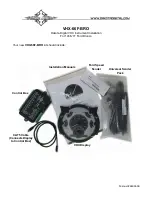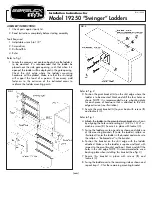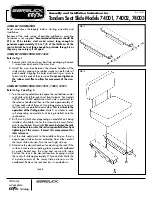
Features of the Test Pump
6
5
4
7
1
3
2
pp01f.eps
No.
Item
Function
)
Master
instrument
port
Port for Fluke 700 Series Pressure
Module. Supplied with 3/8-in. BSP
to 1/4-in. NPT adapter installed.
*
Pressure /
vacuum
button
Push in from this side for vacuum,
and from the other side for
pressure. Use a small screwdriver.
+
Test
pressure
port hose
Flexible hose to pressure
instrument under test.
,
Test
pressure
port
1/4-in. NPT adapter
-
Maximum
stroke
limiter
To limit the pressure from the hand
pump, tighten these nuts to shorten
the compression stroke.
.
Pressure
release
valve
Unscrew to vent pressure from the
pump. Tighten the valve to close
the valve before you apply
pressure.
/
Fine
adjustment
knob
Allows you to precisely adjust the
applied pressure.
Using the Test Pump
TC
mA
mA
V
V
RTD
RTD
SOURCE
300V
MAX
30V
MAX
30V
MAX
30V
MAX
MEAS
CAT
743
DOCUMENTING PROCESS CALIBRATOR
MEAS
SOURCE
SETUP
mA
V
V
Hz
TC
RTD
7
8
9
4
5
6
1
2
3
0
.
S I G N A L
T E S T
+
–
Red
Black
ENTER
CLEAR
( ZERO)
RANGE
Pressure
Module
pp02c.eps
Warning
To avoid a violent release of pressure, always
depressurize the system slowly using the pressure
release valve (item
.
.
.
.
, left) before you detach any
pressure line from the pump. Do not connect the
pump to an external pressure source.
1. Attach a 700 Series Pressure Module (hereafter called
“pressure module”) to the master instrument port.
2. Connect the pressure module to the calibrator as
shown in the figure.
3. Connect the test pressure port hose (item
+
) to the
pressure input of the pressure instrument under test.
4. Make sure the pressure/vacuum button (item
*
) is in
the desired postion.
5. Unscrew the pressure release valve (item
.
) to vent
pressure from the pump.
6. Zero the pressure module. The zeroing procedure
depends on which pressure module and calibrator you
are using.
7. Turn the fine adjustment knob (item
/
) to mid-range.




















